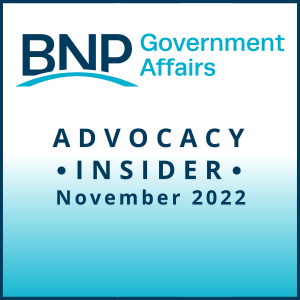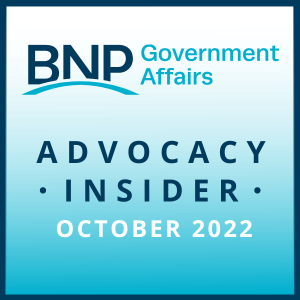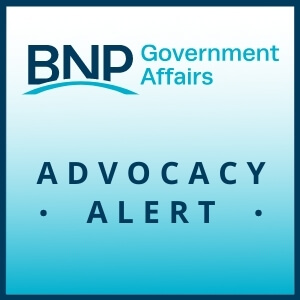Advocacy Alert: Legislature Plants Budget Flag
The State Senate and Assembly Majorities released their one-house budget proposals. Although the proposals are not yet law, they give a clear indication of how negotiations will go before the April 1 budget deadline.
Top insights:
Climate Issues
- Gas Ban. Both the Senate and Assembly propose taking the Governor’s natural gas ban even further, mandating that new buildings SEVEN stories or less be electric-powered in 2025, and buildings above seven stories by 2028. The Governor’s initial proposal initially applied to buildings three stories or less. These proposals represent support in the Legislature for banning natural gas, despite a majority of New Yorkers and 71% of upstate residents opposing it. The Legislature’s proposal is even more aggressive, making the ban apply to more buildings sooner.
- Cap and Invest. The Governor proposed capping statewide carbon emissions, then requiring employers to bid on “emissions allowances.” The Senate clarifies some of the details that were missing from the Governor’s proposal, including clarifications on how the revenue from emissions allowance auctions will be distributed. The Assembly omitted this proposal from their budget, although some form of this proposal remains likely this year.
- Extended Producer Responsibility. This concept would force producers of recycled products to pay for the recycling of those products. The Senate rejected the Governor’s EPR proposal in favor of their own language, which is considered significantly more aggressive. The Assembly omitted this issue from its proposal, indicating a desire to address it after budget season. Although this issue may not ultimately be settled within the budget, we expect the state to enact some form of EPR before the legislative session ends in June.
- Building Public Renewables. Whereas the Governor’s budget proposal simply authorized NYPA to build renewable energy generation facilities, the Senate proposed requiring NYPA to build enough renewable energy to power all state-owned campuses/facilities by 2040. The Assembly wants to scrap the Governor’s proposal but said it remains committed to passing something on this topic. This battle comes down to authorization vs. obligation, but NYPA will be entering the renewable energy market in some way.
- Climate Superfund. Governor Hochul did not include this concept in her proposal, but the Senate added budget language creating a “Climate Change Superfund,” which would levy financial penalties against emitters of greenhouse gases and use the funds for climate-related investments. The Assembly did not mention this issue. The BNP will track this closely over the next two weeks.
Healthcare Issues
- Pay and Pursue. Neither the Senate nor Assembly supported the Governor’s proposed reforms to the health insurance payment process, indicating the issue is likely dead this year.
- NYRx Pharmacy Benefits. The Senate proposed halting the planned change in Medicaid pharmacy benefits set to take place on April 1. Under the Senate’s proposal, 340b providers would have to use a fee-for-service preferred drug list in developing their formulary, but would still retain the benefits of 340b drug pricing. The Assembly proposed delaying the transition three more years.
- Medicaid rate increases. Whereas Hochul proposed a 5% increase in Medicaid reimbursement rates for hospitals, nursing homes, and other providers, the Senate and Assembly proposed 10% increase.
Housing
- Zoning Mandates. A central theme of the Governor’s proposal was to require municipalities to increase housing options through zoning reforms, under the threat of the state overruling towns that grew insufficiently. The Legislature took a different approach, offering financial incentives to towns that achieve growth goals.
- Rental Assistance. The Senate added increased funds toward the Emergency Rental Assistance Program, which prevents evictions and keeps landlords whole.
- Good Cause Eviction. The legislation was absent from the Executive and Assembly budgets, but the Senate stated that it “supports advancing tenant protections that align with the core principles of Good Cause Eviction.” GCE is unlikely to be addressed in this budget, but the Senate’s note of support indicates a willingness to pursue that legislation.
- Brownfield Application Fee. As part of last year’s 10-year extension of the Brownfield Cleanup Program, the state added a costly $50,000 application fee. Neither house addressed the issue in its budget, indicating the fee is likely to remain this year.
Business Issues
- Minimum Wage. Building upon the Governor’s proposal to index the minimum wage to inflation, the Senate proposed increasing the minimum wage before that indexing happens. The Assembly did not endorse the Governor’s proposal but indicated a desire to index the minimum wage. Although neither proposal specified an exact increase, a popular bill in the Senate would raise it to $21.25 by 2026, and then begin indexing. The Assembly also called for a return to one statewide wage, as opposed to the current system that accounts for regional economic differences.
- Unemployment Insurance. Both houses floated the idea of bonding the UI Trust Fund debt to alleviate the burden from employers, with the Assembly calling for $2 billion in bonding authority. While the attention is better than the Governor’s omission on the issue, direct state investment is preferred, and approval of bonding authority in this budget is uncertain. The Assembly also called on the federal government, which sent New York $13 billion under the American Rescue Plan, to help relieve the debt – which most observers agree will not happen.
- Start-Ups. Both houses rejected Hochul’s proposal to replace Start-Up NY with the “EPIC” program, which would require collaboration between startups and universities.
- Clean Slate. This reform would automatically seal the criminal records of individuals who finished their sentences, meaning employers would not be able to check the criminal histories of applicants. The Senate included this proposal in its budget, so it remains one to watch over the next three months.
Education
- SUNY Tuition Increases. The Senate rejected the Governor’s proposal to increase tuition at SUNY schools; the Assembly offered heightened operating aid to SUNYs in lieu of a tuition increase.
- TAP Increases. Both houses called for increasing the $80,000 income ceiling to qualify for the Tuition Assistance Program: $100,000 in the Assembly; $110,000 in the Senate.
Legislators will spend the next two weeks negotiating each of these issues, with the final budget due April 1. The BNP will continue to communicate with lawmakers about the needs of our regional economy and will inform members of the final budget’s contents.
Related Posts
BNP Advocacy Insider – November 2022
Our Monthly Members-Only recap of the latest Advocacy, and Government news.
BNP Advocacy Insider – October 2022
Our Monthly Members-Only recap of the latest Advocacy, and Government news.
10.3.22 Advocacy Alert: NY to Increase Minimum Wage Again
The New York State Department of Labor announced plans to raise the minimum wage in upstate to $14.20/hour, a one dollar increase.
9.26.22 Advocacy Alert: Canada to Remove All Border Restrictions
The Public Health Agency of Canada announced it will lift all COVID-related restrictions on international travelers beginning this Saturday, October 1.



